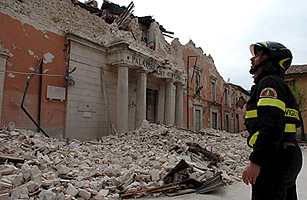
A firefighter looks at a collapsed official building, the Palazzo del Governo, in L'Aquila, Italy
No matter who is talking, any conversation with a resident of L'Aquila will quickly turn to the latest scosse, the aftershocks that continue three months after a major earthquake killed 297 and left some 50,000 homeless in and around this central Italian city.
Last week, on the first night that Maura Scarcella finally went to bed in pajamas since the massive April 6 predawn tremor, another mini-quake shook her awake. The 30-year-old engineer is back to sleeping in her clothes. Dental assistant Emilia Molini, 41, says the one upside of being forced to live in a tent is not having a ceiling when the aftershocks hit. Firefighters giving a rare tour of the decimated (and off-limits) historic center point out new cracks and further sinking of entire floors in already badly damaged palazzi.
And now, with L'Aquila still mourning its dead and getting its bearings — and beginning to debate what will be a multibillion-dollar reconstruction — a very different seismic event is set to take place. The annual G-8 summit begins on July 8, on the campus of a L'Aquila military school, after Prime Minister Silvio Berlusconi's daring (critics say dicey) last-minute decision to shift the high-profile meeting of world leaders to the quake-devastated city. (A strong tremor on July 3 forced Italian officials to confirm that there is a backup plan to move the entire summit at a moment's notice to Rome.)
Convinced that the security being brought in for the world leaders will make life in L'Aquila even more unpleasant, Molini will take her boys out of their temporary tent home and head to the coast. "There are already so many restrictions," she says, sitting in the mess hall of Camp Friuli on a dusty rugby field. "To see more is really weighing on us." She's also not too happy about delays in the rebuilding of the city's neighborhoods in order to focus resources on spiffing up all the official accommodations. Still, Molini hopes that the short-term cost will lead to long-term gain. "It can give visibility to the situation here," she says. "If the 'bigs' of the world take a look around, they may take us to heart."
Such was the thinking behind Berlusconi's decision in the immediate aftermath of the quake — when the often controversial Prime Minister was widely praised for his response to the disaster — to change the long-planned G-8 venue from scenic Mediterranean digs on the island of Sardinia to the rubble of L'Aquila. He will give world leaders a tour of the medieval city center where the restoration of damaged churches and other cultural treasures is alone expected to cost more than $4 billion. The view they will get resembles the aftermath of a bombing raid, as seen on a recent ride-along with local firefighters: a half-crushed dormitory where several university students died; piles of rubble everywhere; giant orange belts and steel cables to steady shaky building columns; a four-story apartment building with the façade missing; the caved-in roof of the 13th century Basilica of Santa Maria Collemaggio.
Berlusconi is counting on his G-8 partners to choose from a so-called shopping list of heritage projects to be supervised and paid for by individual foreign-aid donations.
But beyond the one-off contributions, the unique melding of a major economic summit and a natural disaster may offer a chance to rethink the approach to reconstruction. Mario Pezzini, a director at the Paris-based Organization for Economic Cooperation and Development (OECD), who helped spearhead a recent OECD conference between government and university officials in L'Aquila and international experts on projects to restore the area's economy, sees an opportunity to rethink the very concept of worldwide disaster response. "We all know that there is a good network of civil protection agencies from different countries that respond to the immediate emergency," he says. "What's missing is an international network to work on more long-term economic recovery for these areas struck by disaster."
Back in L'Aquila, though engineer Scarcella continues to sleep in her clothes, her days are spent envisioning her city even better than before April 6. Together with her architect husband, Marco Morante, she founded Collettivo 99, an association of young professionals with expertise in urban-planning, climate change, technology and cultural restoration pushing to turn L'Aquila into a model city — and to make its decade-long rebuilding project into a kind of "laboratory" for remaking a city.
"Politicians tend not to have a long view," says Morante. "But we have to have a vision that goes beyond the emergency." Scarcella adds that many of the themes on the agenda of the G-8 summit — from the environment to a sustainable economy to the digital divide — are also on the agenda for the rebuilding of the city: "They'll be discussing in theory what they can see if they just walk outside." And if they stay long enough, they may even feel the earth shake beneath them.